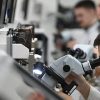 Darren Anderton, David Platt, Gareth Southgate, Teddy Sheringham, Terry Venables and Tony Adams in the summer of 1996. Photo: Reuters
Darren Anderton, David Platt, Gareth Southgate, Teddy Sheringham, Terry Venables and Tony Adams in the summer of 1996. Photo: Reuters
It was a night when England basked in a state of pure delight. And this moment was orchestrated in every detail by Terry Venables. The evening of June 18, 1996 remains one of those midsummer wonders that plunges all who remember it into a brooding stupor. England 4 Holland 1: The defeat of a top nation at a major tournament, the type of event that can be seen at Wembley about as often as a total solar eclipse. Venables told his players to treat this game as the game of their lives, and they followed his instructions to the letter.
As strange as it may seem today, at first he sought to soften the significance of the result. After all, it was a group game. It was only when messages from John Major and Stanley Matthews began to arrive that the reaction became more intense. England could have won more significant victories, but few of them caused such paroxysms of public delight. Strangers hugged each other in the lobby. The next morning, Fairweather fans were still studying every goal in detail.
Over time, Venables realized what he had achieved. He could sleep peacefully, he mused, knowing that his carefully laid plans had borne fruit. England's victory was not some celestial miracle, but a direct result of the self-belief that the manager imparted to his team. 90 minutes before kick-off, he convinced these players of their technical superiority over the Dutch. The monologue evoked an immediate response. “Each player came away convinced that he was better than his colleague,” said Tony Adams, “that the Dutch were just there to take.”
Venables' defining gift, which he put to perfection at Euro 96, was creating a team greater than the sum of its parts. England had a poor harvest that year: Darren Anderton made just four appearances for Tottenham all season and Gary Neville, at 21, had just established himself as Manchester United's first-choice right-back. But under Venables the prevailing idea was that these shortcomings did not matter.
Such inspiration came from an easy sense of power. “He had an incredible ruthlessness and clinical approach,” Neville said. “We had brilliant leaders in the dressing room: Adams, Paul Ince, Alan Shearer, David Platt, Paul Gascoigne, Gareth Southgate, David Seaman. He treated them all harshly — everyone knew who was boss. Without a shadow of a doubt he was the number one England manager of my career.»
Venables, for all his flaws and meanness, meant a lot to many people. For Crystal Palace fans, he will always be the man who presided over their greatest drama, scoring the two injury-time goals that confirmed promotion to the Second Division in 1977. autograph book, as a child he was the man who discovered the glory of the FA Cup. But with England he may have achieved something more. Yes, during the two years of his reign the main trophy was missing. And yes, he had to agree to resign before the start of the Euros, his bravado was too strong for the starched suits of the Football Association. Despite all this, however, he turned the famously impossible job into pleasure.
He was particularly proud of his reputation as the only man in England to represent his country at all levels. Having played for school, youth, under-23, football league and full international matches, he capped off the set with an amateur appearance against West Germany at Dulwich Hamlet. The FA's decision to abandon the amateurs in 1974 ensured that his record would never be broken. It's no wonder that when he was appointed to lead England at home to the European Championships in 1994, he jumped at the opportunity.
Looking back at this chapter, you will immediately be struck by how unclear everything seemed. Compared to the regimented discipline of today's England team, the antics of Venables' team could be appalling, and especially so when Gascoigne used a pre-tournament trip to Hong Kong to sit back in his chair as if at the dentist. and poured alcohol down his throat.
For Gascoigne and the eight teammates involved in this orgy, the shame could be fatal. But Venables defended the honor of his players, and his crisis management was so nimble that when Gascoigne scored his greatest ever goal against Scotland a few weeks later, he repeated the dentist's chair pose on the Wembley pitch — and was deservedly celebrated for it .
 Dentist's chair: effectively sanctioned by Venables Photo: Getty Images/Stu Forster
Dentist's chair: effectively sanctioned by Venables Photo: Getty Images/Stu Forster
Venables' images can be complex. While many admired his affability in the East End, others criticized him for his entrepreneurial ways in business, most notoriously in 19 charges of serious misconduct that resulted in a seven-year ban from serving as a company director. But there is a separate thread of El Tel folklore that his fans prefer to dwell on: namely, his ability for tactical innovation.
Hours after his death, an extraordinary photograph of Venables during his Barcelona days was circulated, lifted into the air by Migueli and Paco Clos after the victory that took the Catalans to the 1986 European Cup final. A giddy teenager from La Masia Academy stands aside, with trembling eyes. His name? Pep Guardiola.
 Venables, lifted up and watched by a young Pep Guardiola, left
Venables, lifted up and watched by a young Pep Guardiola, left
The spell Venables cast that night was profound. Guardiola was part of Barcelona's main staff at the time and often watched games from the touchline or behind the goal. The style Venables came up with was intoxicating as he confirmed his credentials at the Camp Nou with the La Liga title. «TTPP» as he would later call his philosophy: Tactics, Technique, Pace, Personality.
At the center of it all, he reminded the players of what inspired them to become footballers in the first place, reintroducing them to the dream of winning a trophy at Wembley. That image, much to his regret, eluded him, with the highlight of his reign in England instead being his arm around a stricken Southgate. Not that this would jeopardize his place in folklore. Venables was essentially a master strategist and an even greater enthusiast in bringing England back to heights they had long forgotten.
I associate Venables only with laughter. 0b20c1ffee85.html?direct=true&id=8081464f-ad5a-4571-b627-0b20c1ffee85&truncated=false&expandable=false' class='tmg-particle embed wrp-8081464f-ad5a-4571-b627-0b20c1ffee85' name =Data «Author: Des Lynam»- truncated='false' data-business-type='editorial' loading='eager' scroll='no'frameborder='0' style='width: 100%; min-width: 100%; border: none; position: static; display: block; padding: 0px; margin: 0px;'>
I've been expecting this for a while now. Terry fell silent. He was not seen on television and there were no answers from his phone. I knew that he had sold his hotel business in Spain and returned to London with his wife Yvette.
Before Sunday's sad news, I only associated Terry with laughter — he was a funny guy. We've teamed him up with Jimmy Hill to be our experts in BBC football coverage. Their opinions about the game were diametrically opposed. Sometimes they got very hot. My job was easy. I just dropped the topic and watched them do it.
 Des Lynam (centre) and Terry Venables (right) enjoyed a happy working relationship. Photo: Shutterstock
Des Lynam (centre) and Terry Venables (right) enjoyed a happy working relationship. Photo: Shutterstock
Of course, some viewers thought they were enemies, when in fact, away from the cameras, they got along great. Terry told a story about how he got into a taxi and the driver wouldn't leave him alone. “You must not like this Jimmy Hill, Tel,” the driver said. “Well,” Terry replied, “we’re actually friends.” The taxi driver would not agree to this. “I bet you hate him, don’t you?” The conversation continued until Terry confirmed that he might actually dislike Jimmy a little. Anything to get out of the cockpit!
Terry was a top player, an England international and then a coach, but when he was asked to take over at Barcelona it was a surprise. They had been in decline for years, dominated by the other giants of Spanish football, Real Madrid.
Terry not only became a hero by leading Barcelona to their first home title for some time, but and just a penalty shootout after winning the European Cup. “I was just mastering one language when they came up with another,” he said, struggling with his Castilian Spanish and Catalan. “Keep in mind, most players speak better English than I do.”
Terry had a way of brightening up any room, and if you were ever in a situation where there was a microphone handy, you almost had to do. receive a reward from his hands. He loved to sing and had a good voice, perhaps due to his Welsh heritage, although he was always considered an Essex boy.






















































Свежие комментарии